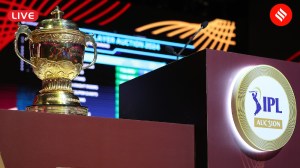With no elected MP in Lok Sabha and its vote share this general election down to 2.04%, the Bahujan Samaj Party (BSP), the only national-level Dalit party in the country, could lose its national status once the Election Commission carries out its customary review post general elections, The Indian Express has learned.
Founded in April 1984 by Kanshi Ram who later named Mayawati as his successor, BSP was recognised as a national party in 1997. It experienced a consistent rise in its electoral performance since its inception before seeing a decline after the 2012 UP Assembly elections.

Currently, there are six political parties recognised as national parties by the poll watchdog – BJP, BSP, Congress, AAP, National People’s Party, and CPM.
According to the Election Symbols (Reservation and Allotment) Order, 1968, a national party is one that has at least 6% of the total valid votes in four or more states in the last general election and at least four MPs; or wins at least 2% of the seats in the Lok Sabha, with the winners being from at least three states; or is a recognised state party in at least four states.
With the party failing to win any seat in the 18th Lok Sabha and getting only 2.04% of the total votes, as per the results available on the ECI website, it fails the first two criteria for retaining its national party status. The final results and statistics for the 2024 elections are yet to be published.
For the third criterion, the party has to meet the conditions for being a recognised state party in four or more states, which it also does not meet as of now. In all state Assembly elections held between 2019 and now, the BSP meets the criteria for being a state party only in Uttar Pradesh, where it won 12.88% votes in the 2022 state polls. In the 2024 Lok Sabha elections, it met the state party criteria, of having at least 8% of the valid votes polled in a particular state, in Uttar Pradesh, where it got 9.39% of the votes.
As per the Symbols Order, a state party is one which has got at least 6% of the total valid votes in a state and at least two MLAs; or at least 6% of the total valid votes polled in the state in the last Lok Sabha elections and at least one MP from that state; or at least 3% of the total seats in the Assembly or three seats, whichever is higher; or at least one MP for every 25 seats allotted to that state in the Lok Sabha; or at least 8% of the total valid votes in the last Lok Sabha election in that particular state or Assembly election.
Story continues below this ad
The EC will start the review process after the statistical reports of the 2024 elections are published, expected in a month’s time, sources said.
The BSP’s national footprint has shrunk significantly over the last four Lok Sabha elections. In 2009, the party won 21 seats with a vote share of 6.17%, but its seats tally was reduced to zero and 4.19% vote share in 2014. In the 2019 Lok Sabha elections when the party had an alliance with the SP, BSP won 10 seats and cornered 3.66% of the vote share.
This is not the first time that BSP’s national status is under scanner. In 2014, when it also had no seat in Lok Sabha and 4.19% vote share, it could have lost its national party status, but an amendment made by EC in 2016 came to its rescue.
Post the 2014 elections, the Symbols Order was amended in 2016 with effect from January 1, 2014 saying that a party’s national or state recognition would not be reviewed in the first election after the one in which they gain the status, meaning the first review would be after 10 years. This benefit was given to all parties, even the BSP, which became a national party in 1997.
Story continues below this ad
The next review took place after the 2019 Lok Sabha elections and the BSP was able to retain its national status as it was a state party in four or more states based on results of the last two cycles of Assembly polls, not just the most recent cycle.
When asked about the national party recognition of the BSP after its poor show in the Lok Sabha polls, BSP Uttar Pradesh state president Vishwanath Pal said: “There are some rules related to vote share for national and state party status. But the Election Commission only can tell about these rules and the future status of the party.”
An EC spokesperson did not respond to requests for comment.
The review process usually takes months after the Lok Sabha elections as the EC reviews the performance of parties and gives them an opportunity to respond, before deciding, sources said.
Story continues below this ad
While the process had started in late 2019 after the Lok Sabha elections that year, the results were only announced in April 2023, when the Aam Aadmi Party was given national status and the Communist Party of India, the Nationalist Congress Party and the Trinamool Congress lost their national party tags.
As a national party, a political party gets certain benefits, including the guaranteed use of their common election symbol for candidates across the country, land or accommodation for an office in Delhi, free copies of the electoral roll and airtime on Doordarshan and All-India Radio during elections.
In the case of state parties, they are given free copies of the electoral roll in their respective states and airtime in the regional centres of the public broadcasters.


































